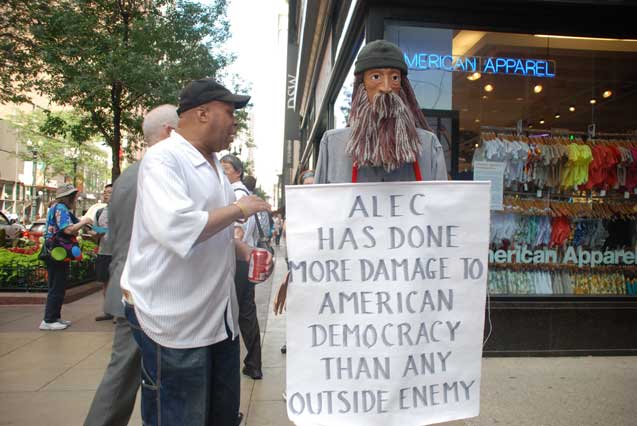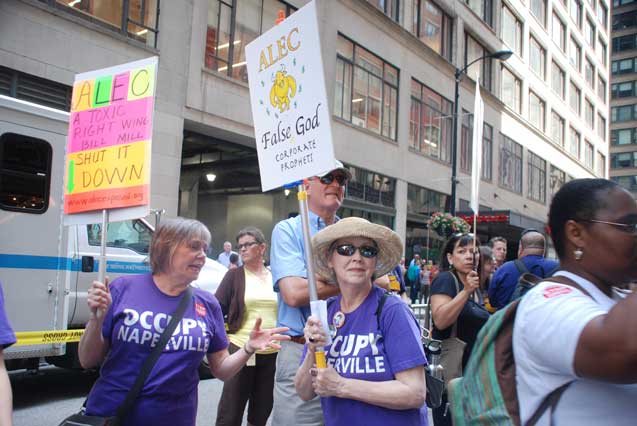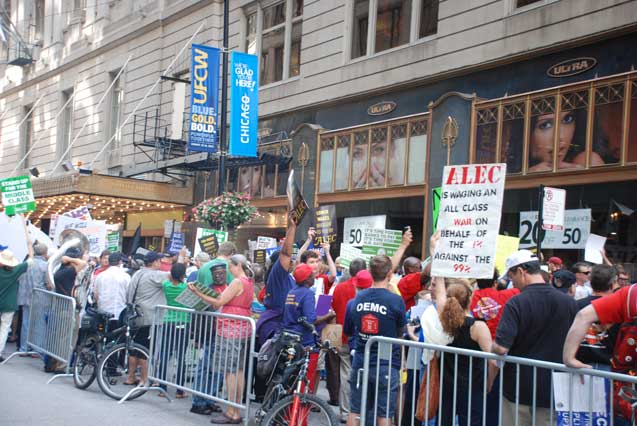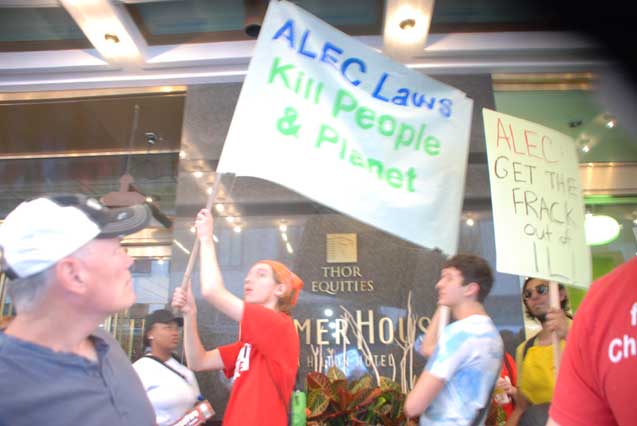
Did you know that Truthout is a nonprofit and independently funded by readers like you? If you value what we do, please support our work with a donation.
A wide coalition of labor, activist and social justice grassroots groups along with concerned individuals turned out in Chicago last week to protest the now-infamous American Legislative Exchange Council’s 40th anniversary conference.
Writing on the building outside the Palmer House Hotel in downtown Chicago says “igniting passions since 1871.” The American Legislative Exchange Council (ALEC) held its 40th anniversary conference at the hotel, igniting the passions of protesters who came out to inveigh against ALEC’s agenda during a demonstration August 8.
Birthed in Chicago, ALEC first met in September 1973. As a 501(c)(3) nonprofit it has tax-exempt status. ALEC “also develops model bills and resolutions on economic issues,” as the organization’s website states, noting that those bills “can be helpful resources” for legislators pursuing privatization of public services.
To kick off the conference, ALEC arranged to have British Parliament member Conor Burns speak at a leadership dinner August 6 before major meeting events the following three days. An ALEC meeting program notes Burns’ relationship with the late Margaret Thatcher, renowned for gutting public projects. He reportedly “visited Lady Thatcher at her home every Sunday evening for drinks [and] developed a close bond.” He described the former prime minister as a “mentor, a protectress [and] friend.”
Coinciding with the early conference dinner, various protests took place at the Palmer House as ALEC members arrived. Direct actions included a #MoralMonday event inside the hotel, a march on ALEC from Michigan and Congress on Wednesday, more picketing and a free film screening of the documentary “United States of ALEC,” narrated by Bill Moyers, at the University Center Chicago, sponsored by Common Cause Illinois.
But the big public declamation and unwelcoming party took place Thursday, August 8. Labor groups, economic justice organizations, independent artists, a few media outlets and myriad others filled the sidewalks along Monroe Street outside the Palmer House.
Organized labor – from AFSCME Council 31 to Greater Northwest Ohio AFL-CIO and retired United Steelworkers – marched alongside Occupy Chicago, Occupy Naperville, the Chicago Anti-Eviction Campaign and Our Walmart.
 A protester proclaims ALEC to be a false God outside the Palmer House Hotel in downtown Chicago. (Photo: James Anderson)
A protester proclaims ALEC to be a false God outside the Palmer House Hotel in downtown Chicago. (Photo: James Anderson)
Tyrone Robinson, an Our Walmart activist who was the lone worker to walk out of a Wal-Mart store in protest on Chicago’s South Side last Thanksgiving, made a point to be there outside the Palmer House to tell ALEC to get out.
“It’s a disgrace,” he said. “Enough is enough. It’s time for everybody to stand up.”
The Illinois Education Association (IEA) and the Chicago Teachers Union (CTU) sent emails to members encouraging them to come to the Thursday rally for the “unhappy anniversary” party, as the IEA put it. It noted ALEC’s involvement in legislation for vouchers that would divert public money to for-profit private schools and charters. A CTU e-bulletin alerted activists that a total of 139 model bills drafted by ALEC in 2013 contributed to the privatization of education.
Of the 139 ALEC bills affecting education, 31 became law, a new report from the Center for Media and Democracy states. In effect, “these bills would siphon taxpayer money from the public education system to benefit for-profit private schools, including the Great Schools Tax Credit Act, introduced in 10 states.”
Timothy Meegan, a CTU delegate for Roosevelt High School who lives in Irving Park on Chicago’s Northwest Side, showed up to help prevent organizations such as ALEC from paving the way for further socialization of costs and privatization of profits.
“I’m here to stop the privatization of public education in my city,” Meegan said.
 Protesters pack the sidewalk all along Monroe Street outside the Palmer House Hotel in Chicago where the American Legislative Exchange Council (ALEC) met for their 40th anniversary conference. (Photo: James Anderson)
Protesters pack the sidewalk all along Monroe Street outside the Palmer House Hotel in Chicago where the American Legislative Exchange Council (ALEC) met for their 40th anniversary conference. (Photo: James Anderson)
At the annual meeting in Chicago, the ALEC Education Task Force convened to discuss five pieces of model legislation with emphasis on “school choice” among other euphemisms for transferring parts of the commons over to concentrated private control. Prior to the meeting, Judy Molland reported that the Education Task Force implemented “a state-by-state report card to fabricate failure in state public education systems in order to create sales opportunities for their corporate membership.”
Chris Medellin, 26, vehemently opposes the ALEC-backed attack on public education.
He protested outside the Palmer House throughout the day Thursday. Medellin currently lives in Humboldt Park and attended the Cicero Public School District 99 as a youth after moving to Chicago from Ciudad Juárez, Mexico, when he was 6.
Medellin participated in Occupy Chicago assemblies in 2011 and has done phone banking with Food and Water Watch. He works with activists in Chicago to fight fracking in Illinois – part of the reason he felt adamant about voicing opposition to ALEC.
ALEC affiliates seek to capitalize on ecological resources, letting the monopoly-finance-controlled “market” dictate policy regardless of environmental degradation externalities associated with hydraulic fracturing.
The Heartland Institute, a Chicago-based organization with a seat at the ALEC exhibition hall during the three-day gathering, seeks “free-market” solutions including “parental choice in education” and advocates “market-based approaches to environmental protection, privatization of public services and deregulation.”
Medellin said virtually everything ALEC has a hand in is against the interests of the American people. He takes even greater issue with the organization now because it is conducting business behind closed doors in his hometown.
“This deeply offends me as a Chicagoan,” he said.
Engaging in direct action through civil disobedience and spreading information within your community about the dangers of unchecked corporate power is imperative, he said. Medellin sees immense value in organizing through online social media but suggests we need to refocus some of the energy devoted to cyber-activism.
 Demonstrations right outside the doors of ALEC’s 40th annual meeting at the Palmer House display signs and decry the organization’s penchant for putting profit over people and planet. (Photo: James Anderson)
Demonstrations right outside the doors of ALEC’s 40th annual meeting at the Palmer House display signs and decry the organization’s penchant for putting profit over people and planet. (Photo: James Anderson)
Concerned citizens need to overcome anxiety about embarrassment and fear of failure because when those thoughts fester, they breed apathy and indifference, he says, whereas getting together with real people can be empowering – and necessary if we want to put people over profits and realize our potential as more than just consumers.
He said almost everybody has friends they can mobilize, but “if you don’t have friends, you know, friend me,” he offered. “I’ll be that guy.”
Medellin spoke approvingly about the significant display outside the Palmer House.
“We just shut down this whole section in opposition to ALEC,” he said, adding that was fitting because ALEC acts to shut down democracy across the entire country.
He cites the anti-immigration law and forceful imposition (and militarizing) of borders that circumscribe people, delimiting freedoms as an example of the bitterly ironic hypocrisy championed by the big business complex ALEC supports. Multinational corporations push through agreements ensuring capital can move freely across borders and that they are free to search out the lowest wages in the world in what political economists call a “global labor arbitrage” now in neoliberal overdrive.
The International Relations Task Force meeting during the ALEC conference had drafting model policy on the agenda with regard to “counterproductive export restrictions on high-tech, LNG and coal; challenges in the US-India trade relationship and economic opportunities with the EU and Taiwan,” among other issues the program pamphlet notes.
“Now they’re being exposed,” Medellin said. But he qualified his statement to emphasize the importance of people continually taking to the streets. He said we cannot willingly submit to the corporate power structure that simultaneously denies freedom while extolling liberty and choice.
“We’re not going to see this revolution televised and all of a sudden Martin Luther King the second reincarnation coming … to call us … out for fucking Shark Week premiere – ALEC edition,” he said. “It’s not going to happen like that. It’s going to happen here. It’s happening right now. We have this building completely surrounded – because people care.”
He said the massive outpouring of people reminded him of the number of activists who demonstrated against NATO when the organization had its meeting in Chicago in May 2012, albeit on a smaller scale.
 Chicago Police push two protesters down to the pavement prior to arresting them along with several other anti-ALEC activists. (Photo: James Anderson)
Chicago Police push two protesters down to the pavement prior to arresting them along with several other anti-ALEC activists. (Photo: James Anderson)
National Nurses United, which also had a rally the weekend of the NATO protests last year to call for a Robin Hood Tax, showed up to oppose ALEC-crafted anti-union legislation. Again, they carried signs supporting a financial trade tax (HR 6411). Yet a tax on financial speculation is anathema to ALEC, although it has little problem with bailouts for private Wall Street banks via public funds. A financial trade transaction tax could raise tens of billions of dollars while reducing speculation, the Center for Economic and Policy Research found, but ALEC is less concerned with revenue generation for the common good and more focused on profit maximization.
In a program letter to meeting participants, Rep. John Piscopo, R-Connecticut, the ALEC National chairman, Private Enterprise Advisory Council Chair for ALEC C. Stevens Seale and ALEC Executive Director Ron Scheberle laud the evolution of their organization into an “effective forum for legislators and business leaders” in which they can engage in a “grand exchange of ideas and experiences to develop state-based, pro-growth solutions that create opportunity for all Americans.”
However, since ALEC’s inception, the US economy has experienced prolonged stagnation and anemic growth. Financialization has kept the economy slugging along, but with recurring crisis and pain for lots of the population – a process working people say ALEC accelerates and exploits.
Melissa Rakestraw, a letter carrier for the Postal Service (USPS), faults ALEC for attacking the public sector via engineered crisis.
“They’re trying to privatize every public service,” she said. “It’s not just schools and prisons. It’s also your post office.”
UPS is involved with ALEC, she added. ALEC lists the company as one of its many private sponsors.
Rakestraw recounted the 2006 law that forced USPS to pre-fund retiree health-care accounts 75 years in advance. The law required $5.5 billion per year to be allotted for a retirement account – for people not even born yet, Rakestraw said. It led to the 80 percent losses the Postal Service is facing.
“It’s an artificial crisis that’s being driven by ALEC-backed legislation,” she said.
“We need to show the legislators that we know what they’re doing behind closed doors.”
Robert Kelly, president of Amalgamated Transit Union (ATU) Local 308, protested in front of the Palmer House for those same reasons.
“What brought us out here is what brought everybody else out here,” he said. “We’re against what ALEC is and what they stand for.”
Cynthia Diaz, a Chicagoan, echoed similar sentiments: “What brings me out? I’m opposed to ALEC and all that it stands for.”
She showed up with a sign proposing a more apt acronym for ALEC: “Amoral Lying Evil Charlatans.”
“I was walking my dog. And when I had to go pick up the shit, this came to me,” she explained.
As disgusted as Diaz, artist and musician Ken Brown went to Chicago from Milwaukee to show solidarity with people struggling against ALEC and the organization’s systematic dismantling of unions – accomplished in part by helping to craft “right to work” legislation.
Activists refer to them as “right to work for less'” laws. Passage of such mandates contributed to the steep decline in union membership in the decades since ALEC started, coinciding with widening inequality.
Coincidentally, the Rich States, Poor States report authored by ALEC economists Arthur Laffer, Stephen Moore and Jonathan Williams, tells readers that “a review of academic studies that have tried to statistically analyze the effects of right-to-work laws have found that right-to-work states outperform their compulsory union counterparts, providing their citizens crucial economic opportunity and a pathway to greater prosperity.”
Yet a study by Economic Policy Institute found no relationship between right-to-work and unemployment rates. EPI research showed that union and non-union workers see an average $1,500 decrease in wages when so-called right-to-work laws are passed, and the analysis suggests those laws fail to attract employers to a state – evincing it as the “wrong answer for Michigan’s economy.”
Michigan Gov. Rick Snyder pushed a right-to-work bill through during a lame duck session in December 2012, and the law took effect March 28, 2013. Buoyed by the Koch brothers’ Americans for Prosperity, the union-busting bill passed by Snyder contained language verbatim from an ALEC model bill, CMD’s PRWatch documented.
ALEC’s aggressive bill modeling for corporate benefit brought a plethora of protesters outside the Palmer House. Resenting enclosure by the Chicago Police Department, several activists pushed back against the metal barricades erected by officers. The police seized protesters in turn, shoving several to the pavement, bloodying one man’s face before putting him in the back of a police vehicle along with others.
Police arrested six people. Nevertheless, protesting continued. So did displays of solidarity. OverthrowALEC@ALECGTFO alerts via SMS helped mobilize people to go to the Palmer House to “welcome” the council to Chicago; activists also sent text messages asking for jail support at 18th and State Street that night because, contrary to ALEC ideology, in the struggle to put people over profit, every person is important.
Trump is silencing political dissent. We appeal for your support.
Progressive nonprofits are the latest target caught in Trump’s crosshairs. With the aim of eliminating political opposition, Trump and his sycophants are working to curb government funding, constrain private foundations, and even cut tax-exempt status from organizations he dislikes.
We’re concerned, because Truthout is not immune to such bad-faith attacks.
We can only resist Trump’s attacks by cultivating a strong base of support. The right-wing mediasphere is funded comfortably by billionaire owners and venture capitalist philanthropists. At Truthout, we have you.
Our fundraising campaign is over, but we fell a bit short and still need your help. Please take a meaningful action in the fight against authoritarianism: make a one-time or monthly donation to Truthout. If you have the means, please dig deep.